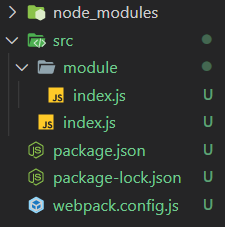開場小提醒 Rollup.js 中文網(https://www.rollupjs.com/) 是別人翻譯的,不是實時更新的優。建議:去原文官網 rollup.js官方文檔 (https://rollupjs.org/guide/en/#overview)
除了我們昨天介紹的webpack模塊打包工具,今天我們就來介紹另外一個常見的javaScript模塊打包器 --- Rollup
rollup.js是Javascript的ES模組打包器,可以將小塊代碼編譯成大塊複雜的代碼,例如library或應用程序。
我們熟知的Vue、React等諸多知名框架或類庫都通過rollup.js進行打包。
這裡先引入官網說明
從前從前,當開發者撰寫專案時,如果將一個專案分解成多個較小的模塊,將有助於專案的開發與維護。並且可以減少組件間的依賴,降低解決的問題的複雜性,但是JavaScript一直以來都沒有將此功能作為語言的核心功能包含在內。
最終隨著JavaScript的ES6修訂版發生了變化,該修訂版開始允許使用導入(import)和導出(export)函數和數據的語法,以便可以在單獨的腳本之間共享它們。但是,
僅在瀏覽器環境中實現,並不允許在Node.js環境中使用。而rollup允許您使用新的模塊(ES模塊)系統編寫代碼,然後將其編譯回現有的受支持格式,例如CommonJS模塊,AMD模塊和IIFE樣式的腳本。
與Webpack偏向於商業應用打包的定位不同,
rollup.js更專注於純Javascript類庫打包(雖然rollup.js也可以提供其他資源打包,但顯然這不是它的強項)。
也因此我們之後會選擇使用rollup來做我們的開源庫打包工具。
注意Tree-Shaking不是所謂去掉沒用到的程式碼,而是在一開始就靜態分析最後會出現的東西,最後比對,只保留確定會用到的代碼rollup.js可以將我們自己編寫的Javascript程式碼
(通過外掛可以支援更多語言,如Tyepscript)與第三方模組打包在一起,
形成一個檔案,該檔案可以是一個庫(Library)或者一個應用(App),
在打包過程中可以應用各類外掛實現特定功能。
這裡我將會用範例說明rollup 與 webpack的差異,
先建立一個空的資料夾,然後用編譯器開啟
輸入npm init -y 等價於 輸入npm init之後瘋狂案enter
再來在跟目錄建立src檔案,之後會將撰寫的程式碼放在裡面,之後照著下圖逐漸建立好目錄架構,哈哈偶很懶不一個一個寫了
在src檔案下逐步輸入我們的測試碼
~/src/module/index.js
import {arrowFunction} from './module/index';
arrowFunction();
~/src/module/index.js
export const arrowFunction = () => {
console.log('hello');
}
~/src/webpack.config.js
const path = require("path"); // 引入 path 來解決巢狀引入路徑問題
module.exports = {
mode: "development", // 設定開發模式就不會 minify
devtool: "none", // 編譯後的程式碼不會有 eval 這樣的用法
entry: "./src/index.js",
output: {
filename: "index.js", // 編譯後的檔名
path: path.resolve(__dirname, "dist") // 編譯後要放在哪個資料夾
}
};
~/package.json
"scripts": {
"start": "webpack --config webpack.config.js"
},
6.最後輸入npm start即可得到webpack的編譯檔喔
~/dist/index.js
/******/ (function(modules) { // webpackBootstrap
/******/ // The module cache
/******/ var installedModules = {};
/******/
/******/ // The require function
/******/ function __webpack_require__(moduleId) {
/******/
/******/ // Check if module is in cache
/******/ if(installedModules[moduleId]) {
/******/ return installedModules[moduleId].exports;
/******/ }
/******/ // Create a new module (and put it into the cache)
/******/ var module = installedModules[moduleId] = {
/******/ i: moduleId,
/******/ l: false,
/******/ exports: {}
/******/ };
/******/
/******/ // Execute the module function
/******/ modules[moduleId].call(module.exports, module, module.exports, __webpack_require__);
/******/
/******/ // Flag the module as loaded
/******/ module.l = true;
/******/
/******/ // Return the exports of the module
/******/ return module.exports;
/******/ }
/******/
/******/
/******/ // expose the modules object (__webpack_modules__)
/******/ __webpack_require__.m = modules;
/******/
/******/ // expose the module cache
/******/ __webpack_require__.c = installedModules;
/******/
/******/ // define getter function for harmony exports
/******/ __webpack_require__.d = function(exports, name, getter) {
/******/ if(!__webpack_require__.o(exports, name)) {
/******/ Object.defineProperty(exports, name, { enumerable: true, get: getter });
/******/ }
/******/ };
/******/
/******/ // define __esModule on exports
/******/ __webpack_require__.r = function(exports) {
/******/ if(typeof Symbol !== 'undefined' && Symbol.toStringTag) {
/******/ Object.defineProperty(exports, Symbol.toStringTag, { value: 'Module' });
/******/ }
/******/ Object.defineProperty(exports, '__esModule', { value: true });
/******/ };
/******/
/******/ // create a fake namespace object
/******/ // mode & 1: value is a module id, require it
/******/ // mode & 2: merge all properties of value into the ns
/******/ // mode & 4: return value when already ns object
/******/ // mode & 8|1: behave like require
/******/ __webpack_require__.t = function(value, mode) {
/******/ if(mode & 1) value = __webpack_require__(value);
/******/ if(mode & 8) return value;
/******/ if((mode & 4) && typeof value === 'object' && value && value.__esModule) return value;
/******/ var ns = Object.create(null);
/******/ __webpack_require__.r(ns);
/******/ Object.defineProperty(ns, 'default', { enumerable: true, value: value });
/******/ if(mode & 2 && typeof value != 'string') for(var key in value) __webpack_require__.d(ns, key, function(key) { return value[key]; }.bind(null, key));
/******/ return ns;
/******/ };
/******/
/******/ // getDefaultExport function for compatibility with non-harmony modules
/******/ __webpack_require__.n = function(module) {
/******/ var getter = module && module.__esModule ?
/******/ function getDefault() { return module['default']; } :
/******/ function getModuleExports() { return module; };
/******/ __webpack_require__.d(getter, 'a', getter);
/******/ return getter;
/******/ };
/******/
/******/ // Object.prototype.hasOwnProperty.call
/******/ __webpack_require__.o = function(object, property) { return Object.prototype.hasOwnProperty.call(object, property); };
/******/
/******/ // __webpack_public_path__
/******/ __webpack_require__.p = "";
/******/
/******/
/******/ // Load entry module and return exports
/******/ return __webpack_require__(__webpack_require__.s = "./src/index.js");
/******/ })
/************************************************************************/
/******/ ({
/***/ "./src/index.js":
/*!**********************!*\
!*** ./src/index.js ***!
\**********************/
/*! no exports provided */
/***/ (function(module, __webpack_exports__, __webpack_require__) {
"use strict";
__webpack_require__.r(__webpack_exports__);
/* harmony import */ var _module_index__WEBPACK_IMPORTED_MODULE_0__ = __webpack_require__(/*! ./module/index */ "./src/module/index.js");
Object(_module_index__WEBPACK_IMPORTED_MODULE_0__["arrowFunction"])();
/***/ }),
/***/ "./src/module/index.js":
/*!*****************************!*\
!*** ./src/module/index.js ***!
\*****************************/
/*! exports provided: arrowFunction */
/***/ (function(module, __webpack_exports__, __webpack_require__) {
"use strict";
__webpack_require__.r(__webpack_exports__);
/* harmony export (binding) */ __webpack_require__.d(__webpack_exports__, "arrowFunction", function() { return arrowFunction; });
const arrowFunction = () => {
console.log('hello');
}
/***/ })
/******/ });
是不是醜醜的鴨,
再次提醒webpack是一個非常好用的工具,但是他生成代碼有很多是非我們所寫的邏輯代碼, 比如一些他自有的模塊加載功能,如果你要開發js庫,那webpack的繁瑣和打包後的文件體積就不太適用了。有需求就有工具,所以rollup的產生就是針對開發js庫的。
而下一章
我們用rollup來編譯同樣的程式碼,請訂閱案讚小鈴鐺喔 。
